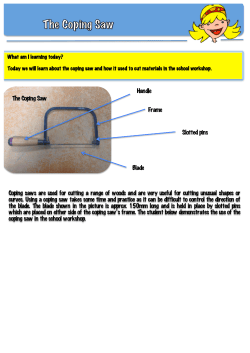
How to use the Templates by numbers tenon template
How to use the Templates by numbers tenon template The tenon template produced by Templates by numbers is printed out, glued to a piece of melamine faced particle board and built into a jig as shown in this article. The tenon jig’s function is to work in conjunction with a router guide bush (collar) to constrain the routing area from the tenon shoulder line to the end of the tenon. The workpiece is routed both sides to form a centred tenon. Tenon jig bottom view The template plan has been used to create a tenoning jig by routing a window and attaching fence pieces to register the workpiece. The router depth of cut determines tenon thickess. Templates by numbers Tenon jig top view A plunge router equipped with a guide bush (collar) uses the window to constrain the cutting path and form the tenon in the desired location. The workpiece is flipped around and each side routed to form a centred tenon. www.templatesbynumbers.com Depending on the workpiece width, the jig makes it possible to route several tenons in one go. Making the tenon jig Starting from the template plan, the steps involved in making the tenon jig are to form a rectangular window in the top of the jig and attach straight edges (end stop and side fence) to register the workpiece. The template plan includes construction lines to help plunge route the rectangular window. The area to be routed to make the jig is highlighted with a blue dotted line. Align scrap straight edges to the outlines indicated with the blue dotted line. The bottom lines is critical as it determines where the tenon shoulder will be. The other lines are less critical as additional fence pieces positioned in the next step are responsible for positioning the workpiece. Straight edges are attached to form the end stop and side fence that will register the workpiece Nail or screw the straight pieces on the ‘Align with workpiece’ line and the ‘Tenon end’ line. The tenon jig is ready for use. Using a router fitted with the router collar and cutter combination specified when you made the template plan, route the area contained within the construction lines. Remove the scrap straight edges. The workpiece is clamped to the jig ready for routing. The template plan specifies a depth of cut to form a centred tenon of the specified thickness. It is a good idea to start with a shallower depth of cut and measure progress with a vernier caliper.
© Copyright 2025
















